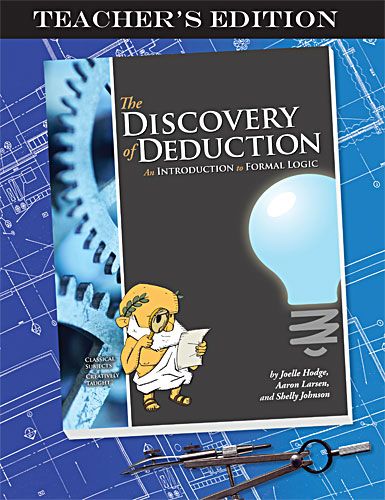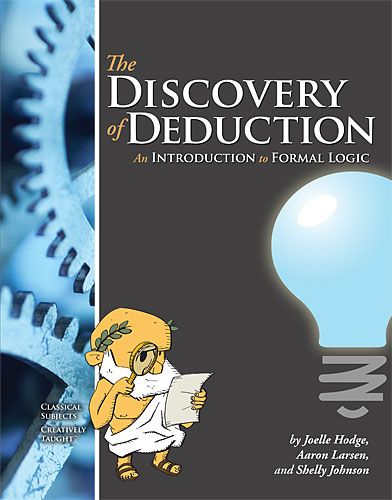This time last year, I reviewed a course called Art of Argument from one of my favorite vendors, Classical Academic Press. It was an excellent course in Informal logic. This year, we've started studying Formal logic with another CAP installment: The Discovery of Deduction: An Introduction to Formal Logic
Informal logic, also known as inductive logic, studies the content and relevance of evidence in an argument. In other words, informal logic challenges ideas and examines the truth behind statements or premises of an argument. Formal logic, also known as deductive logic, studies the structure of an argument. In other words, formal logic explores thoughts further, beginning with ideas that are accepted as true and building upon them. This is the form of logic most often used. Consider:
 We study formal logic so that we can think cleanly; so that our thoughts will not be sloppy. If our minds are the axes that chop away at the unknown, logic is the tool that sharpens the ax. Logic helps us make sense of the world around us. It helps us to know why. You see it in use in deep, philosophical statements such as Descartes' famous line, "I think; therefore I am." You also see it in use every day at the heart of modern computer science.
We study formal logic so that we can think cleanly; so that our thoughts will not be sloppy. If our minds are the axes that chop away at the unknown, logic is the tool that sharpens the ax. Logic helps us make sense of the world around us. It helps us to know why. You see it in use in deep, philosophical statements such as Descartes' famous line, "I think; therefore I am." You also see it in use every day at the heart of modern computer science.
The Discovery of Deduction is an excellent text that teaches students formal logic in an interesting, and even entertaining, way. It challenges some serious thinking and learning, yet just as you begin to think you might be in over your head, it throws in a Monty Python sketch to illustrate a point. The course is intended for students in 8th grade or above and I strongly agree. It is a challenging course and is likely to be overwhelming to younger students. However, the skills taught in this course are skills that will help students in every other subject they study, so it is best for them to study it as early as possible in high school.
The book contains 9 chapter and each chapter contains anywhere from 2 to 8 lessons. There are a total of 44 lessons. Some lessons are as short as just 3 pages. Some are as long as 12. We have opted to study the text over the course of a year, doing lessons twice per week, finishing 1-2 lessons per week. It is intended to be studied over the course of a semester, and CAP has a helpful (free) suggested schedule online, which breaks those lessons down into manageable portions.
Each lesson begins with a list of "Points to Ponder", which introduces and sums up the material being taught. Students go on to a reading portion and then end with review questions. The suggested schedule lists chapter quizzes, but I have never found any quizzes beyond the basic review exercises at the end of each lesson.
Each lesson begins with a list of "Points to Ponder", which introduces and sums up the material being taught. Students go on to a reading portion and then end with review questions. The suggested schedule lists chapter quizzes, but I have never found any quizzes beyond the basic review exercises at the end of each lesson.
"He hoped and prayed that there wasn't an afterlife. Then he realized there was a contradiction involved here and merely hoped that there wasn't an afterlife." - Douglas Adams
 The Discovery of Deduction Teacher's Edition contains an exact copy of the student text, with all of the answers filled in. These answers don't include unhelpful things such as "students' answers may vary." There are occasional "Note to Teacher" boxes that pop up throughout the text with recommendations for outside resources (even YouTube clips) and guidance for knowing what to expect from students. I tend to pinch pennies and I always want to know if it is necessary to purchase both student text and teacher guides. In this course, both books are absolutely necessary.
The Discovery of Deduction Teacher's Edition contains an exact copy of the student text, with all of the answers filled in. These answers don't include unhelpful things such as "students' answers may vary." There are occasional "Note to Teacher" boxes that pop up throughout the text with recommendations for outside resources (even YouTube clips) and guidance for knowing what to expect from students. I tend to pinch pennies and I always want to know if it is necessary to purchase both student text and teacher guides. In this course, both books are absolutely necessary.The course can be worked through completely independently, but it is something that parents don't want to miss out on, if it can be helped. There are frequent dialogue skits which help walk students through arguments and points that are being taught. These skits are much more fun when read aloud with parents and siblings. Also, it's always good for us, as parents, to brush up on those logic skills, particularly when dealing with students old enough to take this course.
The Discovery of Deduction Teacher's Edition $29.95






1 comment:
Homeschool Mom's and Dad's can save money on label supplies by shopping online at www.laserinkjetlabels.com.
Post a Comment